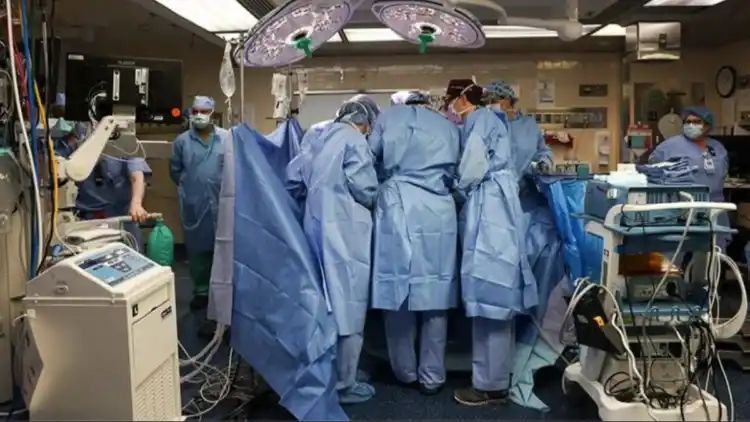Genetically edited pig kidney transplanted into human in world’s first

Doctors at Massachusetts General Hospital (MGH) conducted the world’s first successful transplant of a genetically edited pig kidney into a 62-year-old man living with end-stage kidney disease (ESKD).
The four-hour-long surgery was conducted on March 16 by Harvard Medical School (HMS) doctors. The pig kidney had 69 genomic edits before it was successfully transplanted into the patient.
The patient, Richard Slayman, had type 2 diabetes and high blood pressure, the most common causes of chronic kidney diseases.
Slayman had previously received a human kidney transplant, but that kidney showed signs of failure after five years. It put him back on dialysis with end-stage kidney failure, requiring regular hospital visits for the management of dialysis complications.
“Our hope is that this transplant approach will offer a lifeline to millions of patients worldwide who are suffering from kidney failure,” said Tatsuo Kawai, who helped lead the transplant team.
The first step involved genetically modifying the pig organs to be more compatible with humans. This was done using the gene-editing technology CRISPR-Cas9.
CRISPR is a gene-editing technology which won the Nobel Prize in 2020. It is used as genetic scissors at the molecular level (in the cell), cutting DNA in specific places.
Illustration of the gene edits made to the donor pig. (Photo: Massachusetts General Hospital)
This helped to remove certain pig genes that produce sugars with antibodies our immune system reacts to. Certain human genes were added to improve the compatibility. The modification also helped to inactivate viruses present in the pig genome to eliminate the risk of infection in the patient.
The modified kidney was provided by eGenesis, a xenotransplantation therapy company. Xenotransplantation is when non-human cells, tissues, or organs are used to treat medical conditions in humans.
Pigs are commonly used in xenotransplantation due to several factors. They have organs and tissues that are physiologically similar in size and function to those of humans, making them suitable candidates for transplantation.
As prep for the surgery, Slayman, the patient, received new monoclonal antibody drugs specifically designed to suppress immune reactions against pig tissue.
The organs and immunosuppressant drugs were extensively tested in animal models before being applied to humans.
A pig kidney is unpacked for transplant into 62-year-old Richard Slayman of Massachusetts. (Photo: Massachusetts General Hospital)
Slayman’s nephrologist Dr Winfred Williams said that as soon as the surgical team finished connecting the kidney, the new organ “immediately pinked up.”
“They held up the ureter and it was producing urine,” he said. “Applause broke out in the OR. It was quite an amazing experience.”
Nearly one week after the surgery, Slayman is recovering well and is expected to be discharged soon, according to the Mass General team.
The long-term results of the transplant, however, are not yet clear. “We still don’t know how many years this kidney can survive, but based on our preclinical research, we are aiming at years â more than two years,” said Kawai.
Slayman was approved for the experimental procedure under a single FDA Expanded Access Protocol, or EAP, often called a compassionate-use protocol.
These are granted to a single patient or group of patients with serious, life-threatening illnesses or conditions to gain access to experimental treatments or trials when no comparable treatment options or therapies exist.





